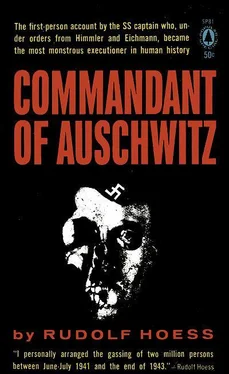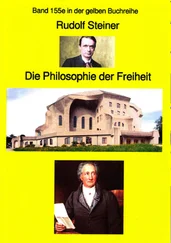The Amnesty Act in question was passed on July 14, 1928.
Rossbach was responsible for Hoess visiting Munich, where he joined the NSDAP in November 1922 with Party number 3240.
In 1929.
This statement requires amplification. According to his SS record file, Hoess joined the SS as “candidate” (Anwärter) on September 20, 1933. On April 1, 1934, he was accepted as SS-Mann, and promoted on April 20 to SS-Sturmmann (private first class). In the affidavit that he signed in British custody on March 14, 1946, he described his career between leaving prison and going to the Dachau concentration camp as follows: “Period 1929-1934, with various agricultural organizations in Brandenburg and Pomerania. Heinrich Himmler was also a member of the League of Artamanen (Gau leader, Bavaria)…. In 1933 on the Sallentin estate in Pomerania I formed a troop of Mounted SS. As a former cavalryman I was asked to do this by the Party and the estate owners…. While he was reviewing the SS in Stettin, Himmler’s attention was drawn to me—we already knew one another from the Artamanen League—and he urged me to join a concentration camp administration. That is how I came to Dachau in November 1934.”
The SS unit that Hoess joined as SS-Unterscharführer (corporal) on December 1, 1934, had been formed earlier that year by Theodor Eicke under the name of Guard Unit Upper Bavaria as part of the General SS. From the end of June 1933 Eicke had been Commandant of Dachau. In that same year Eicke drafted the Disciplinary and Punishment Regulations for use in concentration camps, and also the regulations for the guard units in the camps. In May 1934 Eicke was given the job of rationalizing the concentration camps, some of which, such as Oranienburg near Berlin, had been set up by the SA, while others, such as Dachau, were run by the SS. Eicke played a very prominent part in the murder of Roehm and his followers and the elimination of the SA as a political force on June 30, 1934, and in the following month was appointed Inspector of Concentration Camps and of the Death’s Head Formations, into which the Guard Unit Upper Bavaria was now incorporated. For Hoess’s views on Eicke, see Appendix 8.
The commandant was responsible for the concentration camp as a whole. The SS officer responsible for the camp in which the prisoners were kept was called the Schutzhaftlagerführer (commander of the protective custody camp), whose chief assistant—and the SS official with whom the prisoners came most directly in contact—was called the Rapportführer. Under him were the SS non-commissioned officers responsible for the various blocks, originally called companies.
On March 1, 1935, Hoess was made block leader at Dachau, being promoted SS-Scharführer (sergeant) on April 1 and SS-Oberscharführer (staff sergeant) on July 1, 1935, and SS-Hauptscharführer (sergeant major) on March 1, 1936. From April 1, 1936, until September of that year he was Rapportführer at Dachau. In June 1936 Himmler and Bormann visited the camp, and Hoess was specially recommended for promotion both by the commandant, Loritz, and by his predecessor, Eicke. Himmler and Bormann both being aware of his “past services,” he was promoted SS-Untersturmführer (2nd lieutenant) on September 13, 1936, thus becoming a member of the SS officer corps. From September 1936 until May 1938, when he was transferred to Sachsenhausen concentration camp, he was Effektenverwalter, that is to say, the officer responsible for the administration of stores and of prisoners’ property, at Dachau.
Prisoners who acted as supervisors of the prison barrack rooms, the other prisoners’ work, etc.
Arbeit macht frei was the slogan which Hoess placed above the main gate of Auschwitz concentration camp.
See also Hoess’s description of Eicke as given in Appendix 8.
National SS Leader, Heinrich Himmler; abbreviated RFSS.
According to SS records he was transferred to Sachsenhausen on August 1, 1938.
SS-Standartenführer Hermann Baranowski. From 1936 to early 1938 he had been commander of the protective custody camp at Dachau, under Loritz, where he got to know Hoess, whose transfer to Sachsenhausen he requested.
The reference is presumably to the strike of January 1918.
See Appendix 4.
Equivalent army ranks: lieutenant or captain.
For further information about Jehovah’s Witnesses in the concentration camps, see Eugen Kogan, The Theory and Practice of Hell, New York, Farrar, Straus, 1950, and also Nuremberg Doct. NG-190.
Weltanschauung: literally, “attitude toward the world.”
There follows a brief description of an incident in Pastor Nieniol-ler’s family life, concerning his daughter’s engagement. Since this is of no interest to the public and in no way concerns the subject matter of this book, it is omitted.
The following note is taken from the German edition of this book. Pastor Wilhelm Niemöller, brother of Martin Niemöller and author of the book Kampf und Zeugnis der Bekennenden Kirche (Bielefeld, 1948), after a conversation with his brother, submitted the following comments on the above passage in a letter to the Institut für Zeitgeschichte dated March 8, 1958.
1. The statement that “the whole of the reactionary opposition” joined his Dahlem congregation is, of course, incorrect. Owing to prevailing circumstances the number of educated persons attending divine services at Dahlem was greater than in most Berlin parishes. The fact that the Dahlem congregation was very much alive cannot be minimized by the use of such words as “reactionary” and “dissatisfied.” For the life of that congregation has lasted far longer than did National Socialism. See my book, page 197.
2. Niemöller never preached “resistance.” The National Socialists failed to understand what his preaching was really about. The Confessional Church attempted to preach that men are men, even if their name is Hitler, but that God is God. That a Jew is also human, Niemöller clearly stated.
3. Niemöller was not permitted to write letters as often as he wished. Usually he might send his wife two letters per month. But at various periods he was not permitted to write at all, and this frequently for months on end. It is doubtful whether Hoess ever read a letter of Niemöller’s, since censorship was done by the “political department.” Frau Niemöller was not allowed to bring her husband any books whatsoever in Sachsenhausen. He was permitted books, within limits, after his move to Dachau, though a very strict censorship was of course imposed. The time during which he was allowed out of his cell—initially twenty minutes, later one hour—was very strictly enforced. Only in Dachau was this somewhat relaxed.
4. Hoess implies that regular inquiries concerning the prisoner’s wishes were the most characteristic aspect of Niemöller’s imprisonment. I myself was allowed on one occasion to visit my brother in Sachsenhausen (September 29, 1938), and came away with a very different impression. The commandant had never then inquired concerning the “wishes” of the prisoner. The prisoner can, indeed, not recall ever having seen the commandant. The statement that his cell was made “comfortable” is pure invention on the part of Hoess.
Читать дальше












